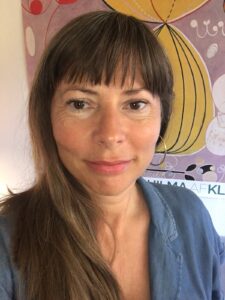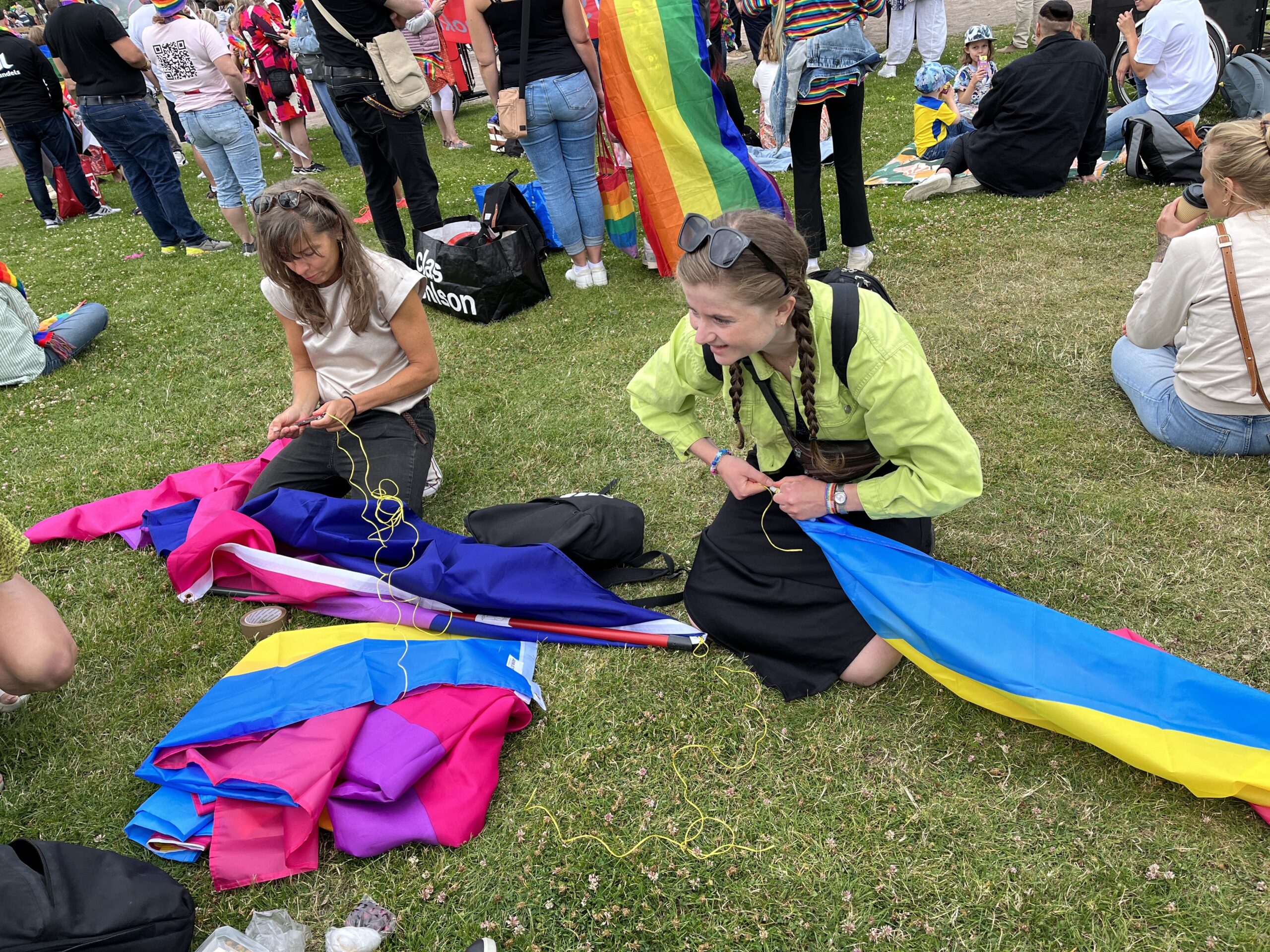By Robyn Ochs
I met Žana in July 2022, when I was invited to speak in Malmö during Pride Week. She was an amazing host. She’s also an amazing organizer.
R: Please tell us about yourself. How did you end up in Malmö?
Z: I was born in Yugoslavia, in what is now Bosnia. I came to Sweden in 1986 as a 10-year-old and that summer was one of loneliness. I missed everything—my dad, my grandmother, the smells, the food, the language, the culture. The Swedish children weren’t especially nice, and I felt isolated. But then I started school to learn Swedish. I was in a class with children who also had come from other countries, and that was a great relief. I met children from all over the world: from Iceland, from Iran, from Kenya. This exposure broadened my mind, and together we could share our impression of how strange Sweden was and how apart from it we felt. We could recognize ourselves in each other. It was a relief, and I made good friends there. Later, when I had the possibility to do so, I moved to Malmö because Malmö is a much more vibrant and pluralistic city. Lund is a very nice town with a great university, but it’s also very white and middle class while Malmö is much more diverse, and I feel much more at home here.
R. How did you come to your identity?
Z: Since I was young, I knew I was interested in women. It never felt difficult or strange, or like something I needed to think a lot about or work through. I always had a greater interest in women, romantically and sexually. I started out as a clear lesbian and, much later, something changed inside me. I found a greater freedom within myself, which also affected my sexuality, and I recognized that I could also be attracted to men.
R: What kind of responses have you gotten from other people—particularly lesbians?
Z: (laughs) I’d been a lesbian for a long time, so I have a lot of cred within that community! There haven’t been any strange reactions. I’m surrounded by intelligent and accepting people who understand that growth and change are an essential part of a life well lived.
R: Do you identify publicly with a sexual orientation identity label?
Z: I work for an LGBTQI+ organization, and I have always been a part of the community, but I’ve always been uncomfortable with putting labels on myself because I don’t feel that a word can really capture the whole experience of loving another human being or being a human being. I’ve been living openly as a lesbian for my whole life and I now identify as a bi person. I feels like an integrated part of myself and I don’t feel a strong need to put labels on myself. Some people attract me; others do not. It’s not so much about their gender; it’s about who they are. Does that make sense to you?
R: It makes sense to me as an internal perspective. I’m curious, though, whether other people make assumptions about how you identify?
Z: People don’t ask me directly, but they make assumptions. I’ve noticed that working lately with bi+ questions, people want to know how I identify—am I part of that community or not? Mostly people are too polite to ask but they may perceive me as more reputable if I’m part of the community. Of course, personal experience of oppression when filtered through a collective is an important base for organizing for LGBTQI+ rights. Professional knowledge is also important, and values. I believe that it’s possible to identify with other people’s emotions without having had the same experiences. Somebody said, “Nothing human is strange to me.” We read books and poetry and those stories resonate with us because we are human. I don’t use my identity to prove a point. I don’t think others need to label themselves to be credible. I work with LGBTQI+ issues because I believe in social justice and a better world.
R: You work for RSFL, a national LGBTQI+ organization in Sweden and are now doing bi+ programming as part of your work. Has RSFL always done this kind of work?
Z: RSFL was started in the 1950s, and the B has been included since the 1970s. Attention to bi+ issues has fluctuated over time. We haven’t always worked with bi+ issues and that, of course, has been a problem. Bi+ people didn’t feel welcome. Like many other organizations, we get funding to work on “LGBTQI rights,” as though we were a homogenous group. But of course, lesbians have some needs, trans people have some needs, gay men have other needs, bi folks have other needs. I feel we should work with each group but avoid fragmenting the community.
I’ve been thinking a long time that we needed to work with bi+ issues and decided we would just start a network. Last year, World Pride was here in Malmö. We had a panel discussion on “Where is the B?” and discussed why the B is so invisible within the LGBTQI+ community. It was a great discussion, and at the panel we announced the date of a meeting. Twenty people showed up to the first meeting. People were really touched to be, for the first time, in a room full of bi+ people. I was touched, too. I just checked our Facebook group, and we are over 300 now, just one year later. It’s amazing! There is really a need for community and I appreciate our community’s diversity. People say they feel very much at home. Nobody is saying you’re not queer enough because of how you organize your life. Now there is a space where you can belong.
R: What is the group called?
Z: We recently changed our name to Bi+ Skåne. One of the reasons was that people use a lot of different words besides bi, pan and/or queer. At the same time, I also took initiative to start a national Bi+ members network in RSFL. A few people thought we were excluding pan and queer people. I felt that was a misunderstanding since we had never had a regional or national space. Language is also continually evolving. Other terms will surely arise in the future. The plus in Bi+ is not meant to put other things under, but to indicate that there is more. We also must be mindful of not fragmenting the community. The struggle is to challenge the hetero/homo dichotomy by showing how diverse human sexuality is. When we fight within our communities, we are misdirecting our energy. Things seem to have settled down, and the national network is growing. We are talking so much more about bi+ people in general.
R: There is so much pain in our community. Sometimes this pain expresses itself laterally, with us attacking each other. It can be challenging to navigate. Here’s my next question: What activities has Bi+ Skåne organized since its formation?
Z: We have monthly meetings and members in the network host lots of activities: going for walks, exercising, singing karaoke. The goal is to provide a place for people to take action and to get involved in building community. In July, a very prominent guest joined us (she laughs). You made quite an impact, Robyn. I think a lot of people felt validated that you came. It signaled that there are prominent bi people and was really empowering. The bi community is still talking about the Bi Forum we had in Malmö where you spoke. You saw the diversity of people who attended. Then we had the parade with a bi+ contingent. In addition, we also went to parades in other cities: in Lund and Skåne, and Helsinborg. Bi+ people were a visible part of the parade for the first time. It was empowering and makes me feel amazed. Something is really happening. We just need to find structures to make sure that we work with bi+ issues every year so it doesn’t keep fluctuating.
I’m also working on a network in the Nordic countries: Denmark, Iceland, The Faroe Islands. Hopefully we can get funding for a Nordic network and a conference. From my outreach, I could see that the other Nordic countries don’t do targeted work with bi folks, but the people I spoke with said they’d like to work more with bi+ issues. Non-governmental organizations often suffer from not having enough resources or people. By opening themselves up to the bi+ community there will be more resources, but they must make themselves open.
R: I love how you’ve progressed from Skåne to all of Sweden, to the Nordic countries!
Z: Yes, next I’m going to take on Europe and then the world!
R: That would be great! Beside taking on the world, what activities would you like to see in the future?
Z: I’d like to see a platform for engaging with the community, where you could work on bi+ issues wherever you are, organizing a bi+ group at your work or at your school/university. We need to create spaces where you can be a whole person wherever you are. If people are more open about themselves, the fact that sexuality is not constricted to one thing or the other will become visible.
R: One of my favorite pins, which I sell on BiProducts, our Etsy shop, says “A normal person is just someone who you don’t know real well yet.”
Z: (Laughs) EXACTLY! I mean, what is “normal”?
R: So many people have complex experiences of identity. We need to break down the perceived wall between gay and straight and open that space.
Z: Everyone would be much happier, and it’s also a much more realistic view of human sexuality.
R: In the U.S. we have Gallup, which collects population data. Is there similar research in Sweden?
Z: Yes, but not every year. I think the last study, a couple of years ago, found that about 18% of young people identify as non-straight, so the trends are similar here to the U.S. data you presented during your visit.
R: Where did you get your data about bisexuality?
Z: I work professionally with LGBTQI+ health and with intimate partner violence. It’s part of my job to keep myself up to date with the research and with the health disparities faced by bi+ people. There is research here in Sweden, in Europe, and in the States. It’s easier for us to compare ourselves with Europe. But wherever you look, it’s easy to find similarities in what’s going on.
I want us to create networks and communities as a way to take action before bad stuff happens. If you have community, if you feel respected, if you feel you have a place, you will have a greater sense of value in yourself. I want to work preventatively by creating communities and relationships. We need each other.
And more than research, we need action. We know about the discrimination, about the violence. I would like to see more qualitative research and theories. We also need strategies and solutions.

Zana
Robyn Ochs is based in Boston, MA. In addition to her work speaking at community groups, schools, workplaces and to health providers, she is the editor of two anthologies, Getting Bi: Voices of Bisexuals Around the World and RECOGNIZE: The Voices of Bisexual Men, and of Bi Women Quarterly.
Featured Image: Preparing for the Malmö parade

